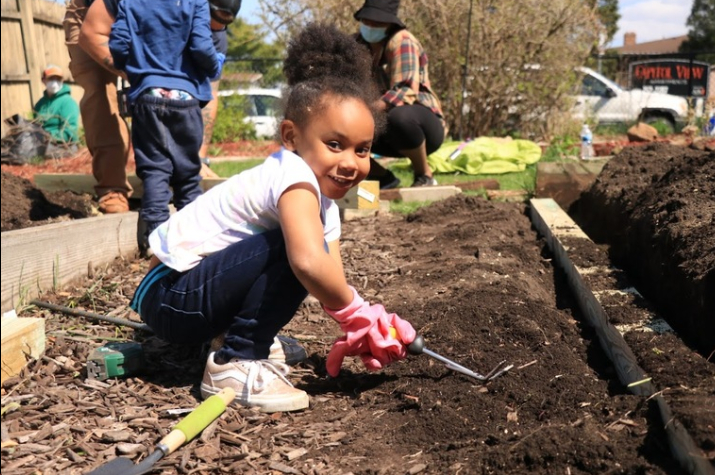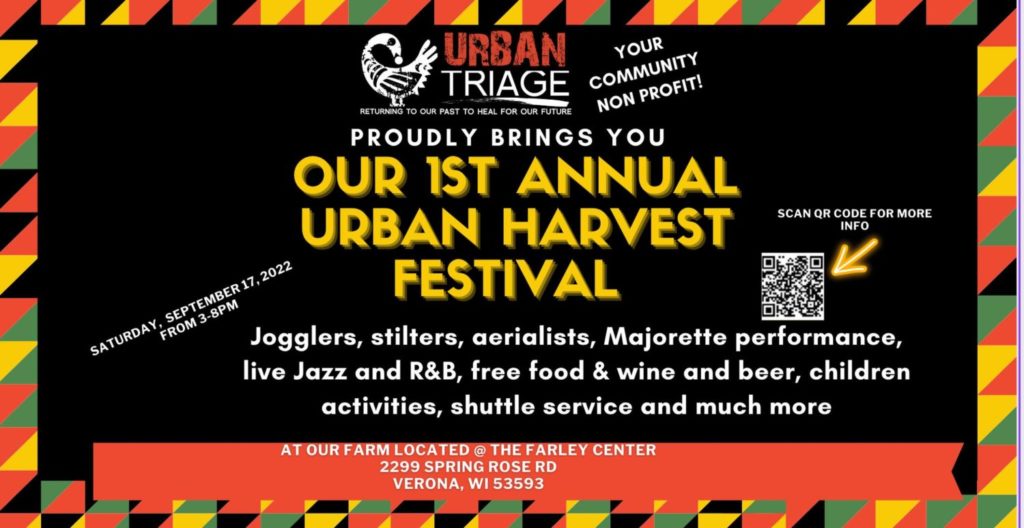
As the incoming fall season quickly approaches, harvesting crops is the task at hand for many farmers and gardeners across the Madison area. One group is especially ecstatic about the harvest season and is celebrating their hard work with a festival. On Saturday, Sept. 17, Urban Triage will be hosting the Annual Urban Harvest Festival at the Farley Center for Peace, Justice, and Sustainability where they have been working alongside farmers to run an agricultural program that educates, feeds, and inspires the community. Ruthanna Hutton-Okpalaeke, Agriculture Program Lead at Urban Triage, is at the helm of their operations at the Farley Center and has worked with the children and guardians throughout the year to get to this point of harvest and commemoration.
“Outcomes of this year include the participation of the kids who come to every class, grow, and get more comfortable,” said Hutton-Okpalaeke. “Along with building that environment around them. We had so much support from partners like the UW Extension who had individuals come out, such as Lisa Johnson, and help the kids learn how to pot down plants and take care of flowers. We had insect ambassadors who were graduate students of Entomology at the university come out. They helped the kids get used to the different insects that they were running into in the garden every day. I know for a lot of people, one of the hindrances of getting into the outdoors, even if it’s just in your garden, is just the insects that you encounter. Early on I reached out to them, and they were completely supportive of the work we were doing and came right out and it was one of the best experiences of the year.”
Experiences with unknowns like new insects and crops can be both exciting and challenging for children to get accustomed to. However, Urban Triage is working to normalize the presence and participation of BIPOC people in the agriculture field by bringing these new ideas and experiences to children in a safe environment.
“Letting the kids be out there to form their own memories and experiences in an agricultural space where they feel like they belong is so important,” Hutton-Okpalaeke said. “They got to see other farmers of color, because the Farley Center is an incubator farm. There’s a lot of different individual farmers and farming groups out there, so they got to be surrounded by other farmers of color and know that they could be in this space too. I think that is what I really wanted for the kids in our program, because we do focus on BIPOC communities in agriculture, and particularly the Black experience in agriculture.”
While many BIPOC workers on farms are often imagined and cast into roles of laborers or helpers, the Farley Center provides a setting where children can see farmers of color who lead agricultural operations at their facility. These examples are a crucial component of making the agricultural field a more open space for children and adults who are looking to participate. The work done by Urban Triage and Hutton-Okpalaeke has allowed them to provide fresh, quality produce to Madison families, especially BIPOC families in need of food assistance, while also involving community members who often bring new perspectives and ideas to the table.
“One of our participants asked, ‘Can we grow peanuts here?’ She loves boiled peanuts,” said Hutton-Okpalaeke. “I was going through all these different varieties of vegetables, and I’m so excited about them because I wanted to show them those different varieties of vegetables. I was going through the varieties of vegetables that I thought would do well here. I didn’t even consider experimenting with a different crop that you don’t see here. Not because it couldn’t grow here, but just because it was kind of outside of my realm of thinking. Because they were coming in fresh, they were like, ‘Why not?’ We experimented and we planted peanuts, and hopefully, they’ll still make it to the end of this month.”
While most people’s experiences with obtaining food often start and end after the produce has already been grown, harvested, and processed, Urban Triage is providing a look behind the curtain with its agriculture program. Community members are able to see how their food is grown, what it takes to successfully bring a crop to harvest, and what amazing results such work can have when they themselves are able to reap the benefits of their work. While many festivals in Madison and the surrounding area celebrate food and harvest, those festivals are often spaces that can feel isolating and alienating for BIPOC community members when there is little diversity in the people or culture present.
“We wanted to create a space specifically dedicated not just for BIPOC people, also white people, but we wanted a space where the BIPOC people didn’t have to feel inhibited in attending it or whatever was stopping them from going,” Hutton-Okpalaeke said. “We’re trying to make it accessible. We’re having a shuttle to take people there from our office on South Park Street to the Farley Center on the day of the event, so that they don’t have to drive out there. Transportation is a big issue for people, and even within our programming, it was a big issue for people…At the Farley Center, we’re having some African drummers do a blessing on the field. I think that’s probably the thing I’m most excited for. We have so many different performers. We have Cigarette Break playing music for us and we have aerialists.”
Urban Triage’s work to get people out to the festival is as meaningful as their work to get community members out in agriculture spaces in general. Providing an accessible and safe space for children and adults who may be less acquainted with the outdoors is the first step to making people more comfortable in agriculture and in nature generally. An equally important aspect of the work is getting people to bring that excitement, knowledge, and love for agriculture back home with them to use in their own communities.
“One of the things we’re thinking about at Urban Triage, and in agricultural programming, is we have this Farm at the Farley Center, and you can go out there, but that’s not where you live,” Hutton-Okpalaeke said. “That’s not where most of our participants are going to be growing vegetables. We’re very aware of that. One of our programs for next year is to do garden bed installations in Madison and in the surrounding areas. Building raised beds so people can plant their own vegetables in the city where they are. We’re going to take you out to the farm, and you’re going to be a farmer out at the farm, then you go home, and you’re not a farmer anymore. We want it to be applicable.”
To learn more about Urban Triage and their Annual Urban Harvest Festival, check out their website here.




